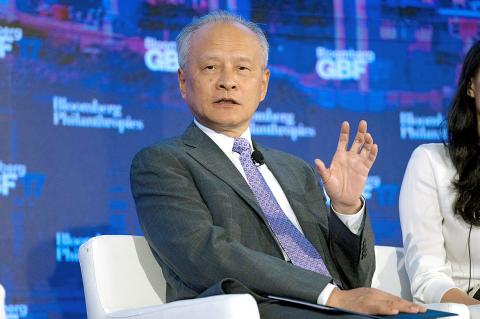Prior to the US House Committee on Foreign Affairs’ passage of a bill that would relax restrictions on mutual visits of high-level officials from Taipei and Washington, China allegedly sent a letter to the US Congress warning against “crossing a red line,” according to the Washington Post.
In a hearing in Washington on Thursday, the committee unanimously passed the Taiwan travel act bill, which seeks to encourage visits between Taiwan and the US at all levels at a time when bilateral ties “have suffered from insufficient high-level communication due to the self-imposed restrictions that the US maintains on high-level visits with Taiwan” since the 1979 enactment of the Taiwan Relations Act.
Although Chinese pressure about Taiwan has become commonplace, Josh Rogin of the Washington Post said the article published earlier on Thursday that a threat-laden letter sent by Chinese Ambassador to the US Cui Tiankai (崔天凱) to leaders of the US House’s and Senate’s foreign relations and armed serves committees in August was considered “unusual and out of line.”

Photo: Bloomberg
Rogin, who claimed to have obtained a copy of the letter, said Cui expressed “grave concern” about the Taiwan travel act bill, as well as other proposed laws or provisions considered friendly toward Taipei, such as the Taiwan security enhancement act bill — which aims to enhance the security of Taiwan and bolster its participation in the international community.
The Chinese ambassador said the bills represented “provocations against China’s sovereignty, national unity and security interests” and “have crossed the red line on the stability of the China-US relationship,” Rogin wrote, citing the letter.
Cui urged the leaders of the committees to use their power to block the bills, Rogin added.
He said Cui’s letter has met with criticism, quoting US Representative Eliot Engel, a ranking member of the foreign affairs committee, as saying that “the letter stood out because of its threatening tone” and that “it is interesting to me that they [China] now feel that they can get away with these kind of threats and vague pressure tactics with the US Congress.”
An anonymous Senate aide told Rogin that such threats and imposition of red lines on US domestic legislative action “is neither helpful nor constructive to build the sort of relationship needed between the US and China.”
When asked to comment on the matter yesterday, the Mainland Affairs Council thanked the US Congress for valuing Taiwan-US interaction.
The ministry expressed the hope that Washington would continue to adhere to the Taiwan Relations Act and the “six assurances” issued by then-US president Ronald Reagan in 1982, support Taiwan’s promotion of policies aimed at ensuring cross-strait peace and stability, and strengthen bilateral Taiwan-US ties.
“These measures could help China adopt a practical and rational attitude, and respect Taiwan’s dignity and interests,” the council said, adding that Taiwan is a sovereign state that is entitled to develop relationships with other nations.

CHAOS: Iranians took to the streets playing celebratory music after reports of Khamenei’s death on Saturday, while mourners also gathered in Tehran yesterday Iranian Supreme Leader Ayatollah Ali Khamenei was killed in a major attack on Iran launched by Israel and the US, throwing the future of the Islamic republic into doubt and raising the risk of regional instability. Iranian state television and the state-run IRNA news agency announced the 86-year-old’s death early yesterday. US President Donald Trump said it gave Iranians their “greatest chance” to “take back” their country. The announcements came after a joint US and Israeli aerial bombardment that targeted Iranian military and governmental sites. Trump said the “heavy and pinpoint bombing” would continue through the week or as long

TRUST: The KMT said it respected the US’ timing and considerations, and hoped it would continue to honor its commitments to helping Taiwan bolster its defenses and deterrence US President Donald Trump is delaying a multibillion-dollar arms sale to Taiwan to ensure his visit to Beijing is successful, a New York Times report said. The weapons sales package has stalled in the US Department of State, the report said, citing US officials it did not identify. The White House has told agencies not to push forward ahead of Trump’s meeting with Chinese President Xi Jinping (習近平), it said. The two last month held a phone call to discuss trade and geopolitical flashpoints ahead of the summit. Xi raised the Taiwan issue and urged the US to handle arms sales to

BIG SPENDERS: Foreign investors bought the most Taiwan equities since 2005, signaling confidence that an AI boom would continue to benefit chipmakers Taiwan Semiconductor Manufacturing Co’s (TSMC, 台積電) market capitalization swelled to US$2 trillion for the first time following a 4.25 percent rally in its American depositary receipts (ADR) overnight, putting the world’s biggest contract chipmaker sixth on the list of the world’s biggest companies by market capitalization, just behind Amazon.com Inc. The site CompaniesMarketcap.com ranked TSMC ahead of Saudi Aramco and Meta Platforms Inc. The Taiwanese company’s ADRs on Tuesday surged to US$385.75 on the New York Stock Exchange, as strong demand for artificial intelligence (AI) applications led to chip supply constraints and boost revenue growth to record-breaking levels. Each TSMC ADR represents

State-run CPC Corp, Taiwan (CPC, 台灣中油) yesterday said that it had confirmed on Saturday night with its liquefied natural gas (LNG) and crude oil suppliers that shipments are proceeding as scheduled and that domestic supplies remain unaffected. The CPC yesterday announced the gasoline and diesel prices will rise by NT$0.2 and NT$0.4 per liter, respectively, starting Monday, citing Middle East tensions and blizzards in the eastern United States. CPC also iterated it has been reducing the proportion of crude oil imports from the Middle East and diversifying its supply sources in the past few years in response to geopolitical risks, expanding